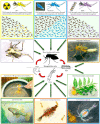Biological Control of Mosquito Vectors: Past, Present, and Future
- PMID: 27706105
- PMCID: PMC5198200
- DOI: 10.3390/insects7040052
Biological Control of Mosquito Vectors: Past, Present, and Future
Abstract
Mosquitoes represent the major arthropod vectors of human disease worldwide transmitting malaria, lymphatic filariasis, and arboviruses such as dengue virus and Zika virus. Unfortunately, no treatment (in the form of vaccines or drugs) is available for most of these diseases andvectorcontrolisstillthemainformofprevention. Thelimitationsoftraditionalinsecticide-based strategies, particularly the development of insecticide resistance, have resulted in significant efforts to develop alternative eco-friendly methods. Biocontrol strategies aim to be sustainable and target a range of different mosquito species to reduce the current reliance on insecticide-based mosquito control. In thisreview, weoutline non-insecticide basedstrategiesthat havebeenimplemented orare currently being tested. We also highlight the use of mosquito behavioural knowledge that can be exploited for control strategies.
Keywords: Wolbachia bacteria; arboviruses; boosted SIT (Sterile Insect Technique); copepods; larvivorous fishes; mosquito-borne diseases; sex pheromones; sound traps; sterile insect technique; swarm manipulation.
Conflict of interest statement
The authors declare no conflict of interest.
Figures
References
Grants and funding
LinkOut - more resources
Full Text Sources
Other Literature Sources
Miscellaneous


